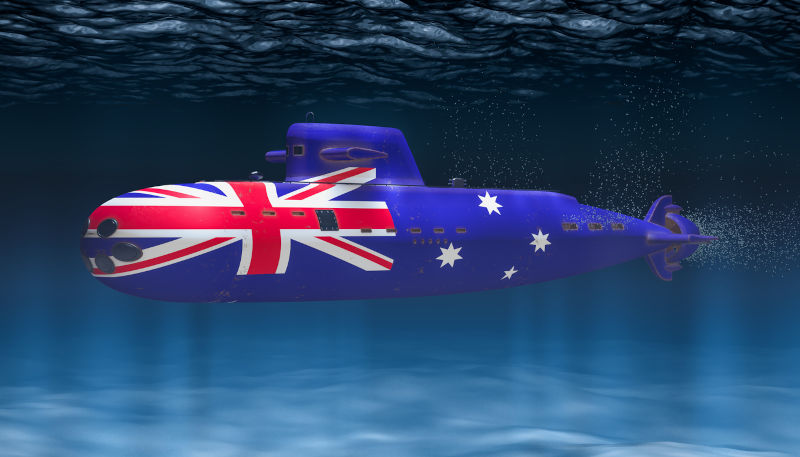Defence’s defeat on the French Submarine was an extraordinary victory for a small group of dedicated professionals. Defence’s counterattack with the nuclear submarines under the aegis of AUKUS reeks of the same old problems.
It has been my privilege over the last five years to sit on the periphery of a small group of friends who are retired senior public servants, later joined by a number of senior retired naval officers, that contributed to sinking the ill-fated Attack class French submarines that the Australian Navy had committed to purchase.
The group, that I understand was ‘affectionately’ known in Defence as The Syndicate, was ably led by Jon Stanford and produced a series of publications, public forums, and briefing notes for politicians highlighting the many deficiencies in this program. These included the fact we had handed the prime contractor Naval Group a monopoly from the design phase on, contrary to recommendations from reviews of previous procurement stuff ups; it was too expensive relative to the competing bids and international cost benchmarks; that the delivery schedule was far too long with the first submarines to be delivered over a decade away; and finally that the pump jet propulsion system proposed was untested and most probably unsuited to conventionally powered submarines. Apart from these issues it was a great deal! Of course, Defence and the government of the day would never acknowledge we had any influence on the decision to dump the French, but it’s clear this was part of the process that was its undoing. It was a significant victory, one that makes the battle between David and Goliath seem like a relatively even contest.
Sadly, the exit path from this deal adopted by the previous government was not only clumsily executed, bringing down the wrath of the President of France, but made a bad situation worse. As with the initial decision, it was made by the National Security Committee of Cabinet with no opportunity for independent assessment by the co-ordinating departments such as PM&C, Finance or Treasury. Again, we effectively threw ourselves at the mercy of a sole supplier with no firm price, only the certainty that it will be significantly even more the Attack class submarines. Nor do we have any agreement on domestic industry contribution. Only the high probability that it will be even less than Naval Group were reluctantly offering. And finally, a likely delivery schedule that is even longer than in the original decision.
In addition, the prospect of us acquiring nuclear powered submarines without any consultation with our Asian neighbours was received very badly, and more importantly reinforced our image and reality as the European outpost that continues to cling to our Anglo-Saxon big brothers for our security in the region.
The exit path was camouflaged under the grand acronym of AUKUS and surrounding commitments to ongoing technology sharing and operational ‘interoperability’ of capabilities. Apart from the stuff up with Macron, politically it all worked extremely well. The rationale for the shift to nuclear powered submarines was justified by the deteriorating strategic environment in the South China Sea, code for fear of China. Conventional submarines were considered unsuitable and too vulnerable to make the trips up to Hainan on the China coast where the Chinese submarines are based. Nuclear submarines are much faster and can stay submerged much longer than conventional diesel electric submarines making them much more suitable for this task. There had been strong support for their acquisition over some years given the length of our shoreline, distance to areas of likely operation, and advances in submarine detection technologies.
The Labor Party opposition almost immediately embraced the AUKUS exit. Shadow Defence Minister Marles has long been a supporter of us acquiring nuclear powered submarines and Labor is always very conscious of being wedged by the Liberals as ‘weak on national security’. There was a more than usually high risk of this given the strong anti-China sentiment that the Liberals and their defence minister Dutton were whipping up. Most commentators, even those who had staunchly defended the French submarines from the group’s criticisms applauded the change of course. Most of the members of our group also supported the initiative, if with some reservations about delivery. I was one of a few in the group who did not.
My major reason for not supporting the nuclear submarines was that they and the AUKUS arrangements they were wrapped up in tied us even more closely into the US defence establishment than we are already. The core technologies that will guide, power, and arm the submarine are all owned by the US, whoever builds the rest of the boats, and tightly controlled by them. They are likely to require at least one US naval officer on board to access some of the systems and they effectively won’t be able to operate without US support. This further diminishes our ability to make independent strategic decisions and erodes our control over our own defence forces.
This point is strongly contested by the government and other members of our group, but all the evidence since the second WWII supports the contrary view, and just asserting that ‘it doesn’t have to be this way’ doesn’t mean it doesn’t, just as asserting we retain sovereign control doesn’t mean we do in fact. It’s a vague notion and who would know or tell. It is the familiar old situation of wanting our cake and to eat is as well.
The other reason I didn’t agree with the acquisition of the nuclear submarines is that I am appalled by the billions of dollars that Defence continues to waste on failed acquisition projects and can’t stomach the idea of giving them even more, as the nuclear submarines will require. It is not just the submarines. It’s the helicopters, ships, tanks, etc. that have proved to be disasters, and the list goes on. The reasons for these failures have been examined, documented, and recommendations made on how to avoid them in the future on several occasions in the last few decades. But nothing changes and no one is ever held accountable. The fact is that the culture in our Defence Department is rotten and requires a root and branch change from the top down.
Amongst the other critics of AUKUS the most articulate and authoritative has been Prof. Hugh White. He argues that we cannot continue to depend on the US to come to our aid as our default defence strategy. Our ANZUS treaty doesn’t compel them to do this and the military dominance they had, especially in our region, to enable it is diminishing in the face of China’s increasing defence spending and technical capability. In this context Hugh argues that we need to develop an independent defence capability and that this would require a different defence force structure, including more numerous conventional submarines rather than the eight nuclear powered ones proposed as part of AUKUS. In his mind we should aim to become a middle ranked military power that may not be able to withstand a full-on assault from a major power like China, but would like the echidna with its spikes, make the prospect of engagement very uncomfortable. Hugh acknowledges that this would be expensive, requiring us to raise the proportion of GDP on defence from 2% to between 3 and 4%. He also acknowledges that there is no guarantee we would succeed in making this transition.
I think Hugh’s case for a more independent defence strategy is a strong one. Where I diverge from Hugh is that despite all the rhetoric that has been flying around over the last few years, I still believe the prospect of China or any other regional power like Indonesia or India making a direct or even indirect attempt to occupy or control Australia is still very remote. The greatest risk of attack we face comes from our role as a proxy for the USA in this region. Thus, in the context of an escalating military conflict between the US and China the Chinese may decide to signal their preparedness to use nuclear weapons against the US mainland by sending one to Australia, possibly directed at Pine Gap or a smaller city like Adelaide. Strategically this is a very plausible scenario and much more realistic than occupation of the far northwest to secure access to our resources or to gain some strategic geo-political advantage (presumably to attack New Zealand or Macquarie Island).
The other reason I depart company with Hugh on this is that I believe changing the culture of the Defence Department is an urgent and critical task, and I don’t believe you can do this while you are almost doubling their budget. It is akin to giving an alcoholic the keys to the wine cellar when you want them to give up the grog.
In a perfect world I would wind back our defence spending, retaining the effort on cyber security and anti-terrorism, increasing the focus on the utilisation of new technologies and capabilities that we are seeing having an impact in the Ukraine war. I would also put more emphasis on building stronger ties with our regional neighbours with both soft and hard power. The new Labor government is focusing on all these areas but in the context of increasing overall defence spending and under supporting closer defence ties to the US. However, I also recognise the political reality that Labor faces. Defence is not Labor’s natural political territory. There is virtually no upside in differentiating itself from the Liberals in this area and a lot of downside, as history would attest. Taking on defence’s strategy and culture would use an enormous amount of political capital and be extremely high risk. Right now, we also have a minister for defence who shows no interest in or appetite for the effort that such an undertaking would require.
For this reason, Labor may well adopt the second-best solution for our defence strategy, continue with our bipartisan policy of ‘all the way with LBJ’, as a former prime minister so succinctly put it, and buy the nuclear submarines.
If that is the result, at least try to demand some accountability from Defence leadership by no longer guaranteeing funding at 2% of GDP in the way we have to date.
Bill Mountford has held senior positions in the Victorian and Commonwealth governments and worked as an economic and business strategy consultant.

